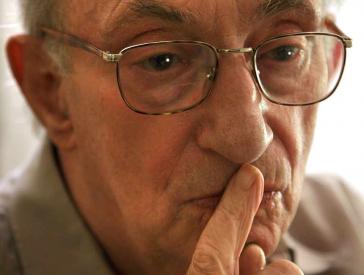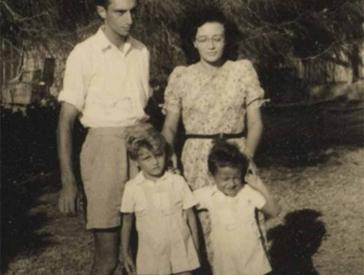Walter Frankenstein
Eyewitness to History and Donor
Walter Frankenstein was born in 1924 to a Jewish family in Flatow, West Prussia. When he was no longer permitted to attend the public school there beginning in 1936, his uncle found him a place in the Auerbach Orphanage in Berlin, where he met his future wife Leonie.
In 1938, Walter Frankenstein began training to be a mason at the Jewish Community's school of architecture and construction crafts, but Nazi oppression prevented him from fulfilling his dream to become an architect. Beginning in 1941, he was enlisted into forced labor and repeatedly threatened with deportation.
Walter and Leonie married in 1942 and had their first son Peter-Uri the following year. Five weeks after his birth, the young family went into hiding in Berlin, taking refuge at friends’ homes and in the ruins of bombarded buildings. His second son Michael was born in 1944. The only at her two children temporarily found a hiding place on a farm in Briesenhorst. The family survived the final days of the war in late April 1945 in a public bunker.
At the time of liberation, Peter-Uri and Michael Frankenstein were the youngest of the twenty-five German Jewish children who survived the war in Berlin.
In November 1945, Leonie managed to emigrate to Palestine with her two children. When Walter attempted to join them in Palestine, he was captured and detained in Cyprus. The family did not reunite until the summer of 1947. Immediately after the declaration of the Israeli state, Walter was conscripted and fought in the War of Independence in 1948. He and a friend started a business in 1953 and built irrigation systems for various kibbutzim.
In 1956, the Frankenstein family relocated to Sweden. After Walter was forced to retire from masonry in 1965 for medical reasons, he completed a high school equivalency exam and studied to be an engineer, graduating in 1970. In his retirement, from 1984 onwards, Walter Frankenstein traveled extensively with his wife to destinations that included Germany and Israel. For his commitment as an eyewitness to history, he was awarded the German Order of Merit on 30 June 2014.
The Walter and Leonie Frankenstein Collection at the Jewish Museum Berlin contains more than 1,100 objects. The photographs, albums, and writings document his life from early childhood through retirement.



 X
X

